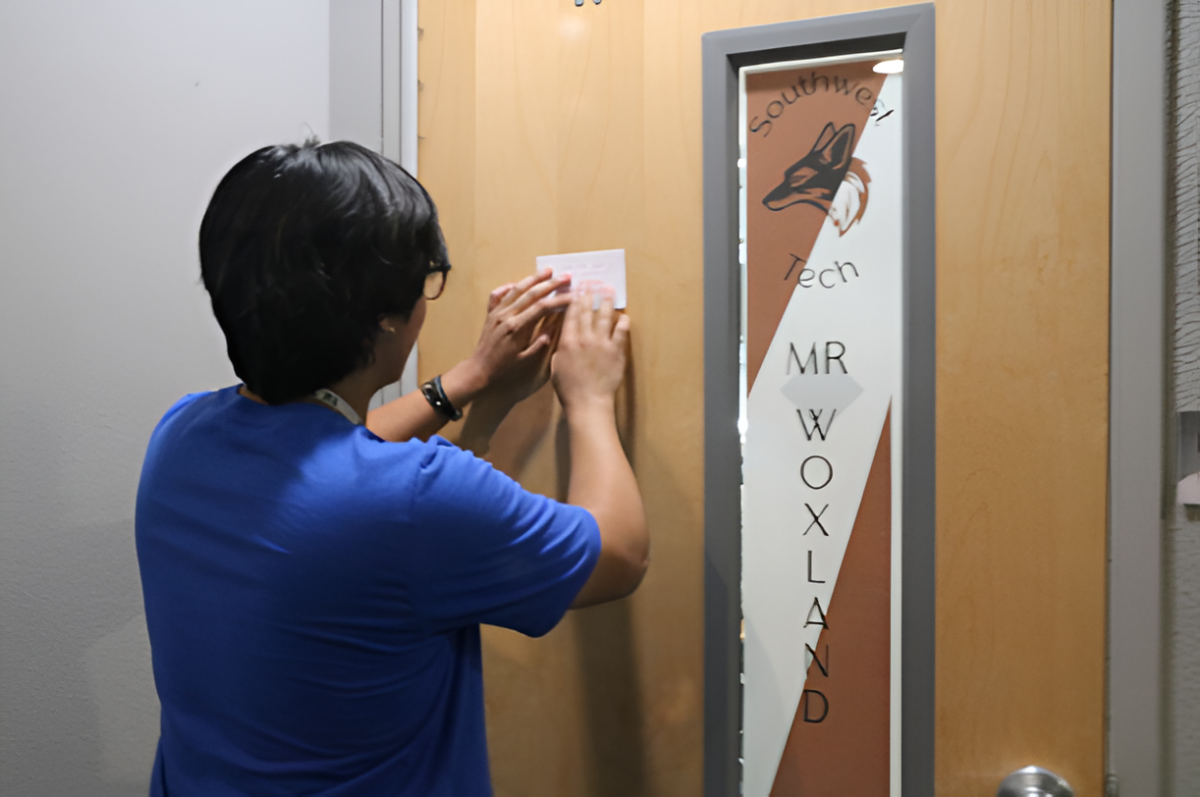Chronic absenteeism has become a major issue, especially led by juniors. Seeking for improvement, administration has brought in Assistant Principal Eric Gant, with a 20-year history in discipline and attendance, to oversee all student attendance alongside Student Success Advocate Chrystal Howard in H136.
“I approached it as a new administrator here to speak with the teachers at the department chair conferences where we meet with administrators and department chairs once every two weeks,” Gant said. “I asked them, ‘What’s the biggest concern you have as teachers?’ I was told tardies, specifically in the first period. That was just in mid-January.”
Collecting data upon his arrival, Gant found that an average of 80-100 students are marked tardy for their first period on a daily basis.
“I have been tardy a few times from the bus being late before,” freshman Ketan Eichelberger said. “Recently I saw a kid running across the street to get to the bus on time just for the driver to drive off really quick and leave him because we couldn’t [afford] being late.”
Announced in the school newsletter and aired on the morning announcements, Gant made public his intentions to implement new procedures and policies regarding attendance. Additionally, the online absence excuse link was removed from the school website and students are now required to bring in signed notes with their name, date and reason of absence.
“It was actually input from staff to help me decide what I needed to do, which I found was re-implementing tardy lockouts,” Gant said. “I was also firm that if you got one you would be getting a 90-minute after-school detention the next school day.”
Many students argue that their tardiness springs from issues beyond their control, such as morning traffic and difficult family schedules.
“Sometimes if you’re a freshman you can’t control when your big sister is dropping you off or there [are] families that have three siblings at three different schools, and those are situations I had to understand,” Gant said. “I put in every single kid who gets a signed detention to double check when they’re coming in to make sure they can, and to let them know that if they can’t make their time to contact me in advance.”
Over the past month, tardies have significantly decreased to an average of 15-30 students tardy for their first period. In parallel, Gant decreased the required detention time from 90 to 45 minutes.
“I’ve seen a huge difference to tell you the truth,” Gant said. “I’m hopeful that we can go away from the every morning thing and pretty soon just do spot [lockouts] where we just kind of do one every once in a while, and just pick random periods throughout the day.”



![Working in the Student Success Office, Attendance Secretary Lordis Depiazza inputs a student’s absence excuse note. Students are required to bring an excuse note to the attendance office within three days of any absence. “Reminding students that being in school is important because it reflects towards your grades and being able to do any activities with the school,” Depiazza said. “[It] seems to get the students' attention about wanting to be in school.”](https://southwestshadow.com/wp-content/uploads/2025/10/IMG_8313-1200x800.jpg)

![Squaring up to a practice dummy, sophomore Cypher Andres prepares to throw a punch. Dummies are regularly used to help him prepare certain hits to take his opponents down. “[Boxing dummies help me practice] because it’s basically a model of the body,” Andres said. “It helps with accuracy, such as pressure points behind the ear, and a clean liver shot can end the fight.”](https://southwestshadow.com/wp-content/uploads/2025/10/IMG_5728-e1759850486200-1200x864.jpg)

![Arranging the fabric on the floor for a new project, senior Sapphyre-Ann Leung plans out her attire for the next deadline. With the recent closures, students now had limited resources and less margin for error with the fabric and materials they had in stock while trying to reach strict deadlines. “Joann’s had a lot of high-end fabric for our fashion competitions,” Leung said. “We couldn’t just buy ten yards of fabric from Hobby Lobby or Walmart. Since [Joann Fabrics] is no longer open, we have to buy items online, which is way more expensive.”](https://southwestshadow.com/wp-content/uploads/2025/10/IMG_0038-1200x800.jpg)


![Practicing the basic skills of nursing, sophomore Natalia Yancey gets her heartbeat checked with a stethoscope. Sophomore nursing students reviewed skills from freshman year. “I’ve always wanted to be in the medical field; it’s been my dream forever,” Yancey said. “Doing [practice skills] so early on is not only an amazing opportunity, but it helps me to prepare for my future.”](https://southwestshadow.com/wp-content/uploads/2025/10/IMG_9843-1200x800.jpg)


